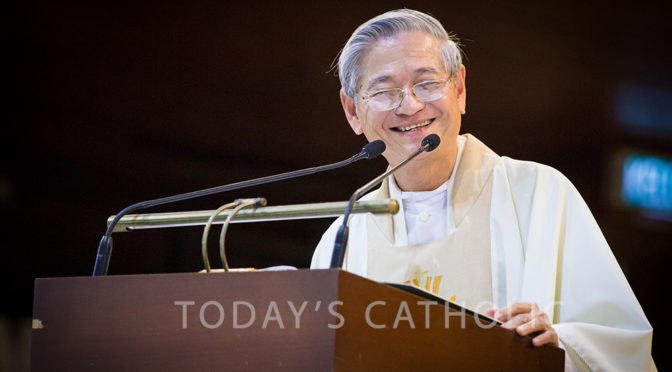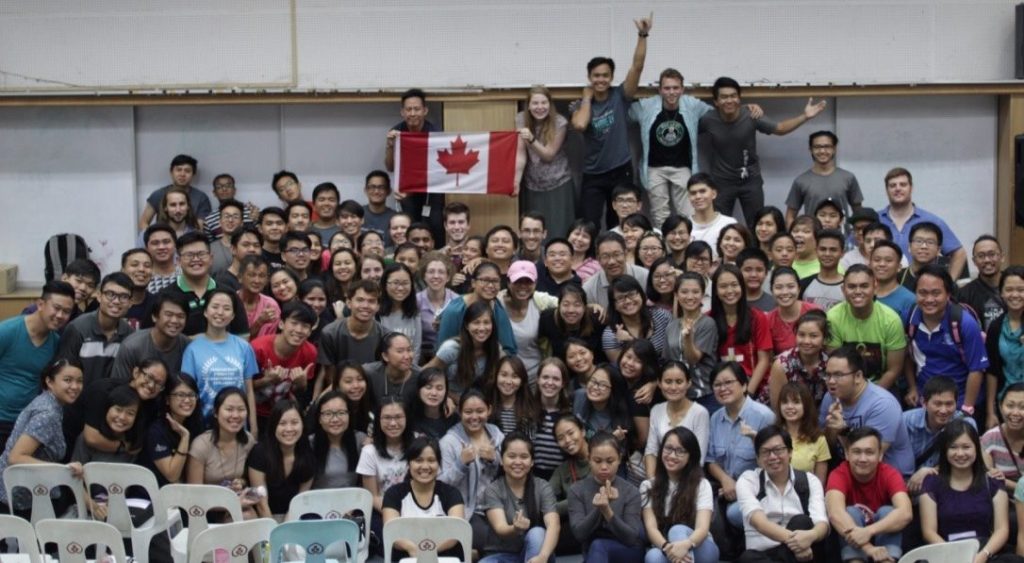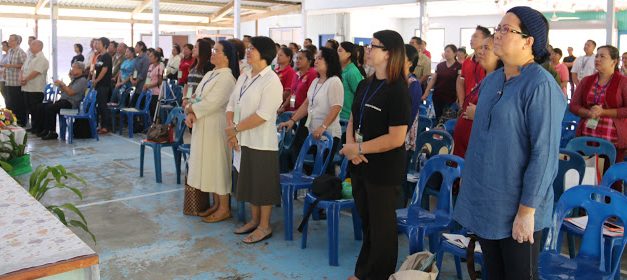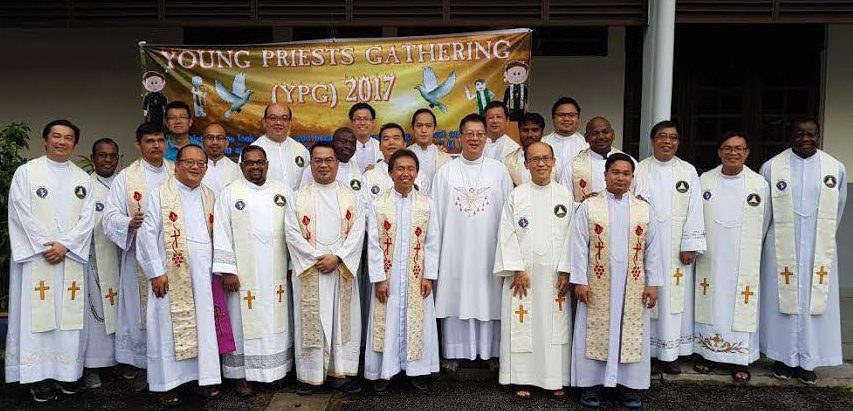Below is a reflection on the pastoral use of the Bible in conjunction with Bible Sunday, 9 July 2017:
“In the beginning was the Word, and the Word was with God, and the Word was God.” (John 1:1)
Divine Revelation as God’s self-revelation
Our Catholic faith is based on divine revelation. Before Vatican II, the concept of “revelation” was referred to as a list of truths which disclosed information about God. In Vatican II, however, our understanding of revelation evolved into God’s self-revelation in the person of Christ, who is the Word made flesh. Christ, the Eternal Word, comes to reveal the face of God to humanity as well as to invite each man and woman to enter into an intimate communion in the life of the Holy Trinity1 (Dei Verbum 2).
In fact, Christian faith springs from an encounter with Christ. When Jesus who is the Word of God speaks, He calls for openness on the part of the listener to respond to Him in faith by allowing Him to transform and orientate his/her life. As Pope Emeritus Benedict XVI wrote in Deus Caritas Est, “Being Christian is not the result of an ethical choice or a lofty idea, but the encounter with an event, a person, which gives life a new horizon, and a decisive direction” (#2).
The Bible and the Catholics of today
Nowadays, people tend to have little or no time and space to be quiet as they rush to meet deadlines and aim to be productive. As Catholics, we too can be stuck in the busyness of getting things done, even in the church arena, that we forget what is most essential, that is, to encounter Christ. It is easy to busy ourselves by undertaking charitable activities and organisational duties in parishes and neglect cultivating an inner life of prayer with the Word of God. The more we grow deaf to His Word, the greater the risk that our faith becomes rancid and dry. As Fr James Meehan once said, “Don’t work so hard for God that you forget the God for whom you work.”
Prayerful reading of the Word of God is not a common habit among Catholics. In fact, numerous families possess Bibles but many keep them as part of religious items on display. They are not used to reading the Bible. Some even mistakenly think that the Bible has no place in the Catholic tradition.
The Word of God, for some Catholics, does not make sense to their life circumstances as they search for life’s direction, grapple with sickness and old age, deal with pain and loss, labour to make ends meet, etc. However, they have yet to discover that the pages of the Scriptures do in fact contain answers to their problems and questions. God speaks to them through His Word and leads them to find the quiet joy of His presence amid the peaks and valleys of daily life. Through this, they would then be able to give an account for their hope to those who ask for it (1 Pet 3:15).
It is also a common view among young people that the Bible is simply a book with lots of verses that instruct them as to what God expects of them. Many find that the Bible does not provide adequate explanation to the complex world around them.Therefore, most young adults today find the Bible to be uninteresting and irrelevant to their lives and do not see the need to read it. What can the Church do for the faithful in order that they may come to a closer contact with God’s Word?
Letting the Bible inspire all pastoral work
The role of the Church is to facilitate and promote such intimate grace-filled encounters between Christ and His people through His Word. Thus, it is of great importance for all Christian faithful to be encouraged to attentively listen to God’s word and have a prayerful reading of the Bible, in order to live their faith passionately.
“Along these lines the Synod called for a particular pastoral commitment to emphasise the centrality of the Word of God in the Church’s life, and recommended a greater “biblical apostolate,” not alongside other forms of pastoral work, but as a means of letting the Bible inspire all pastoral work.” This does not mean adding a meeting here or there in parishes or dioceses, but rather of examining the ordinary activities of Christian communities, in parishes, associations and movements, to see if they are truly concerned with fostering a personal encounter with Christ, who gives himself to us in his word. 5(Verbum Domini)
As People of God, there are many areas in which we, as lay catechists, religious, priests, parents, grandparents, teachers, etc. can commit to make the Word of God more central in our own lives as well as in the Church’s life, and foster a life-transforming personal encounter with Christ.
To initiate and sustain this personal relationship, we must recognise the essential role of those entrusted with the proclamation of the Word of the God daily. For the Word of God to be the foundation of the Church’s life, the faithful need to hear it proclaimed authentically by preachers who themselves are people who pray and live the Word out in their daily lives. The Homiletic Directory published by the Congregation for Divine Worship and Sacraments states: “The homily will be delivered in a context of prayer and it should be composed in a context of prayer.” Therefore, preaching is a sacred duty whereby preachers speak from the heart to the listeners and place them with Christ, only Christ. Preachers must be people of prayer so that none of them will become an “empty preacher of the Word of God outwardly, who is not a listener to it inwardly.” (St Augustine, Sermons)
The Word of God touching the realities of life
The parish must be the hub where the faithful, as diverse people, can gather as one community of faith to listen to and apply God’s Word to their lives so as to journey toward a greater authenticity as Christians. Priests and the faithful of each parish must be creative in offering opportunities for the Bible to be heard, prayed and shared. Too often, biblical texts are used as aids to draw lessons in morality or simply as a tool to indicate a time for discussion. Lay catechists, youth leaders, faith formators, etc have the responsibility to create conditions in which Catholics, young and old, may develop their inner ability to listen to Jesus and personally experience the transforming power of His Word.
In order to make the Bible more relevant to the lives of the people, parishes can consider having a pastoral-biblical care ministry that provides responses from the Bible to human problems such as sickness, racial divisions, injustice, death, etc, in order for people to bring their life circumstances into the light of the Word of God. This was the experience of St Augustine whose life was transformed when he allowed the Word to resonate with his personal struggle of living a chaste life. While praying in the garden, he heard a child’s voice saying, “Tolle, lege!” (“Take and read!”) St Augustine took his Bible and read the first passage his gaze fell on. It happened to be Romans 13:13. The biblical text made sense to St Augustine whose life changed after that personal experience with the Word of God.
Bible and the young people
Our Catholic community can help to promote the Bible through resources like Bible-based music or comics or artwork that draw young people to appreciate more the Word of God. There can be more youth ministries that are primarily centred on the Bible where young people can encounter the living Christ through praying and sharing the Word. Parents and godparents play an essential role in forming the faith of children and youth by setting examples and being people whose foundations are rooted in God’s Word. Pope Francis, addressing parents and godparents in a homily, said: “Every day, make it a habit to read a passage of the Gospel, a small one, and always carry a little Gospel with you in your pocket, in your purse, so you can read it. And this will set the example for your children, seeing dad, mom, their godparents, grandpa, grandma, aunts and uncles, reading the Word of God.”
Lectio Divina
Vatican II states that “the treasures of the Bible are to be opened up more lavishly so that a richer fare may be provided for the faithful at the table of God’s Word” (Sacrosanctum Concilium)
Average Catholics hear the Word of God when they attend Mass. Their interaction with the Word of God ends when they leave the church and head back to their daily routines. Thus, there is a greater need today for “pulling the Christian scriptures from the margins back to the centre as the text for living the Christian life deeply.” (Eat this book)
An effective way of putting the Bible at the centre of Christian living is by using the method called Lectio Divina, which is a traditional monastic practice since the 6th Century. It comprises 4 steps: Read, Meditate, Contemplate and Live. Lectio Divina can be used by any group in the parish. In fact, its straightforward method can be adapted to cater to children and youth groups in the parishes.
The first step of Lectio Divina is a prayerful and personal reading of a passage of the Bible. It is taking in a biblical text until it sinks into the heart of the person and opens him/her to dialogue with Jesus. The second step of Lectio Divina is meditating on the Word of God by placing the person’s gaze firmly on a word or a phrase of the passage. As the person starts to ruminate on the Word, he/she is slowly drawn from the matters of the mind to the matters of the heart. From the heart, the person starts to contemplate and enjoy the presence of God in the wordless silence. From prayerful reading, meditation and contemplation of the Word, the person is led to become a “doer of the Word.” The Word of God becomes fruitful when the person starts to live it out and makes his/her life as a gift for others. As Pope Francis said, “The Christian life is this: listen to the word of God and practice it.”
Conclusion
On this Bible Sunday, let us, with humble hearts, give thanks to God for the invaluable gift of His Word. Christ never gets tired of speaking to each of us and inflaming our hearts with the fire of His love. May we always be eager to nourish ourselves with the Word so that we can be disciples of the Word made flesh, our Lord and God.
Questions for reflection
- As Catholics, do we take delight in the Bible as our spiritual treasure?
- Does God’s Word provide the daily nourishment for our faith?
Article reproduced from Catholic Archdiocese of Kota Kinabalu











